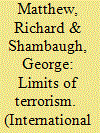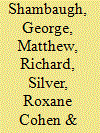| Srl | Item |
| 1 |
ID:
067057


|
|
|
| 2 |
ID:
094766


|
|
|
|
|
| Publication |
2010.
|
| Summary/Abstract |
The American policy landscape during the George W. Bush administration was shaped by a series of traumatic events that confronted the nation and people of the United States. These included the terrorist attacks of 9/11 in 2001, the anthrax attacks in the fall of 2001, military actions in Afghanistan and Iraq, Hurricane Katrina in 2005, the threat of a flu pandemic in 2005 and 2006, the 2007 Intergovernmental Panel on Climate Change reports, and the financial collapse of 2008. The results of the 2008 presidential election appear to be a rejection of the Bush administration's major policy responses to these events, but the variation in type and level of public support among different groups suggests a much more varied and dynamic portrait of America in turbulent times. Using a multiyear panel survey, an interdisciplinary team of political scientists and psychologists analyzed the behavior and political responses to the events by the American public. The findings suggest that even seven years after the events of 11 September 2001, people with higher levels of post-traumatic stress symptomatology related to 9/11 have significantly different interpretations of the threat of terrorism and the appropriate policy responses to it than do others. Perceptions of threat, the political salience of terrorism and other traumatic events, the level of support for political leaders and assessments of the government's actions vary over time and across different groups within society based on the psychological, political and social, and personal characteristics of the respondent. These results help to open the black box of aggregate public opinion by providing a detailed portrait of how psychological, social, political, and personal factors affected perceptions and political behavior during the George W. Bush administration.
|
|
|
|
|
|
|
|
|
|
|
|
|
|
|
|